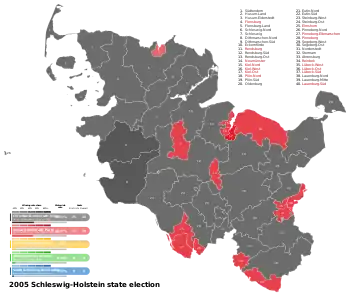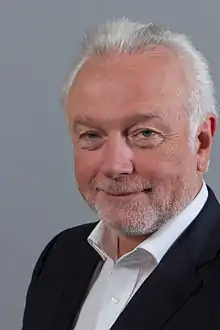| ||||||||||||||||||||||||||||||||||||||||||||||||||||||||||||||||||||
All 69 seats of the Landtag of Schleswig-Holstein 35 seats needed for a majority | ||||||||||||||||||||||||||||||||||||||||||||||||||||||||||||||||||||
|---|---|---|---|---|---|---|---|---|---|---|---|---|---|---|---|---|---|---|---|---|---|---|---|---|---|---|---|---|---|---|---|---|---|---|---|---|---|---|---|---|---|---|---|---|---|---|---|---|---|---|---|---|---|---|---|---|---|---|---|---|---|---|---|---|---|---|---|---|
| Turnout | 1,434,805 (66.5%) | |||||||||||||||||||||||||||||||||||||||||||||||||||||||||||||||||||
| ||||||||||||||||||||||||||||||||||||||||||||||||||||||||||||||||||||
 Results for the single-member constituencies | ||||||||||||||||||||||||||||||||||||||||||||||||||||||||||||||||||||
| ||||||||||||||||||||||||||||||||||||||||||||||||||||||||||||||||||||
The 2005 Schleswig-Holstein state election was held on 20 February 2005 to elect the members of the Landtag of Schleswig-Holstein. The incumbent coalition government of the Social Democratic Party (SPD) and The Greens led by Minister-President Heide Simonis was defeated, bringing an end to 17 years of SPD governments in the state.
The result was a deadlock, with the right-wing parties (CDU and FDP) being one seat short of majority and the left-wing parties (SPD and the Greens) two seats short, with SSW thus holding the balance of power.
After a failed attempt to invest a minority SPD–Green government supported by the South Schleswig Voters' Association (SSW), the SPD agreed to join a grand coalition with the Christian Democratic Union (CDU). CDU leader Peter Harry Carstensen was subsequently elected Minister-President.
Campaign and issues
Surveys before the election indicated that most voters considered high unemployment in Germany and Schleswig-Holstein to be the key issue of the campaign. Pre-election polls indicated that the personal popularity of Heide Simonis was still high, though, and that the SPD–Green coalition had the support of a plurality of voters. However, the unpopularity of the federal SPD and the Hartz IV reforms appeared to have taken a toll.
Parties
The table below lists parties represented in the previous Landtag of Schleswig-Holstein.
| Name | Ideology | Leader(s) | 2000 result | |||
|---|---|---|---|---|---|---|
| Votes (%) | Seats | |||||
| SPD | Social Democratic Party of Germany Sozialdemokratische Partei Deutschlands |
Social democracy | Heide Simonis | 43.1% | 41 / 89 | |
| CDU | Christian Democratic Union of Germany Christlich Demokratische Union Deutschlands |
Christian democracy | Peter Harry Carstensen | 35.2% | 33 / 89 | |
| FDP | Free Democratic Party Freie Demokratische Partei |
Classical liberalism | Wolfgang Kubicki | 7.6% | 7 / 89 | |
| Grüne | Alliance 90/The Greens Bündnis 90/Die Grünen |
Green politics | Anne Lütkes | 6.2% | 5 / 89 | |
| SSW | South Schleswig Voters' Association Südschleswigscher Wählerverband |
Danish and Frisian minority interests | Anke Spoorendonk | 4.1% | 3 / 89 | |
Opinion polling
| Polling firm | Fieldwork date | Sample size |
SPD | CDU | FDP | Grüne | SSW | Others | Lead |
|---|---|---|---|---|---|---|---|---|---|
| 2005 state election | 20 Feb 2005 | – | 38.7 | 40.2 | 6.6 | 6.2 | 3.6 | 4.7 | 1.5 |
| Forsa | 16 Feb 2005 | 1,002 | 40 | 37 | 7 | 6 | 4 | 6 | 3 |
| Universität Kiel | 17 Jan–11 Feb 2005 | 750 | 39.4 | 37.3 | 7.0 | 10.6 | 3.3 | 1.2 | 2.1 |
| Forschungsgruppe Wahlen | 8–10 Feb 2005 | 1,106 | 40 | 37 | 7 | 7 | 4 | 5 | 3 |
| Infratest dimap | 7–9 Feb 2005 | 1,000 | 41 | 36 | 7 | 7.5 | 3 | 5.5 | 5 |
| Forsa | 1–4 Feb 2005 | 1,059 | 40 | 37 | 7 | 7 | 3 | 6 | 3 |
| Infratest dimap | 14–18 Jan 2005 | 1,000 | 40 | 37 | 7 | 8 | 3 | 5 | 3 |
| Forsa | 17–21 Dec 2004 | 752 | 39 | 37 | 7 | 7 | 4 | 6 | 2 |
| Infratest dimap | 8–13 Dec 2004 | 1,000 | 38 | 39 | 7 | 8 | 3 | 5 | 1 |
| Infratest dimap | 1–3 Nov 2004 | 1,000 | 38 | 39 | 6 | 10 | 3 | 4 | 1 |
| Infratest dimap | 18–23 Aug 2004 | 1,000 | 31 | 42 | 7 | 11 | 4 | 5 | 11 |
| Forsa | 22 Aug 2004 | ? | 32 | 40 | 8 | 9 | 5 | 6 | 8 |
| dimap | 7–12 May 2004 | 1,005 | 31 | 48 | 6 | 9 | 4 | 2 | 17 |
| Forsa | 22 Feb 2004 | ? | 33 | 44 | 8 | 8 | 4 | 3 | 11 |
| dimap | 17 Dec 2003 | ? | 29 | 48 | 6 | 9 | 4 | 4 | 19 |
| dimap | 2 May 2001 | 1,005 | 41 | 35 | 10 | 6 | 4 | 4 | 6 |
| 2000 state election | 27 Feb 2000 | – | 43.1 | 35.2 | 7.6 | 6.2 | 4.1 | 3.7 | 7.9 |
Election result
 | |||||||
| Party | Votes | % | +/- | Seats | +/- | Seats % | |
|---|---|---|---|---|---|---|---|
| Christian Democratic Union (CDU) | 576,095 | 40.2 | 30 | 43.5 | |||
| Social Democratic Party (SPD) | 554,879 | 38.7 | 29 | 42.0 | |||
| Free Democratic Party (FDP) | 94,935 | 6.6 | 4 | 5.8 | |||
| Alliance 90/The Greens (Grüne) | 89,387 | 6.2 | 4 | 5.8 | |||
| South Schleswig Voters' Association (SSW) | 51,920 | 3.6 | 2 | 2.9 | |||
| National Democratic Party (NPD) | 27,676 | 1.9 | 0 | ±0 | 0 | ||
| Others | 39,913 | 2.8 | 0 | ±0 | 0 | ||
| Total | 1,434,805 | 100.0 | 69 | ||||
| Voter turnout | 66.5 | ||||||
Outcome
After the election, the SPD–Green coalition no longer commanded a majority of the Landtag. The SSW announced that although it would not enter a coalition, it saw more common ground with the SPD than the CDU. Minister-President Simonis proceeded to form an SPD–Green coalition based on an agreement with the SSW backing it.
On 17 March, the vote to invest the government failed, with the secret ballot tying 34–34. It is not known who abstained, though it is widely believed to have been a representative of the SPD. Since the coalition had failed, the SPD was forced to negotiate a grand coalition agreement with the CDU, capitulating to the CDU's demand that CDU leader Peter Harry Carstensen replace Simonis as Minister-President.
References
- ↑ "Endgültiges Ergebnis der 2009er Landtagswahl in Schleswig-Holstein" (PDF) (in German). Landeswahlleiter. 2010-01-28. Retrieved 2012-05-05.



